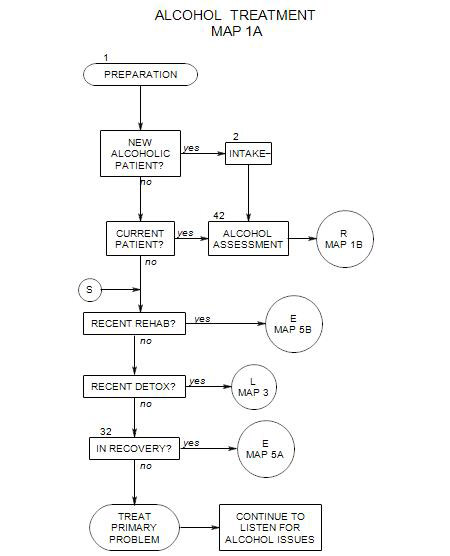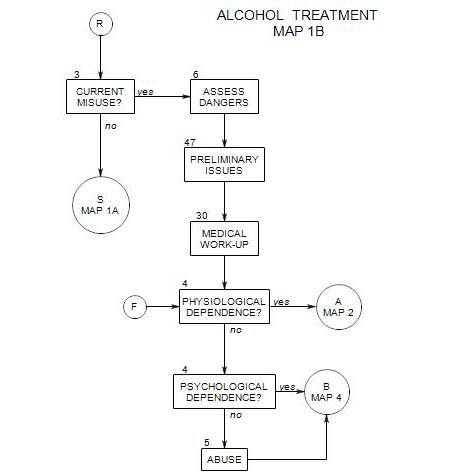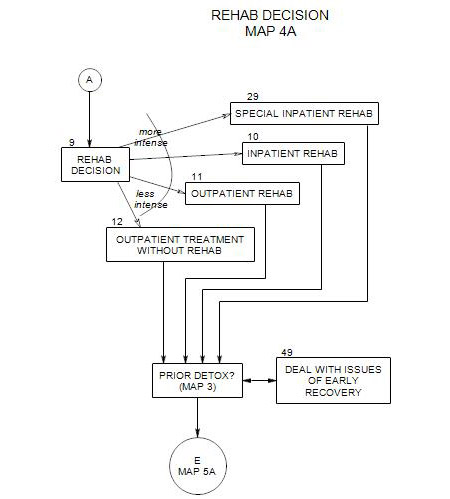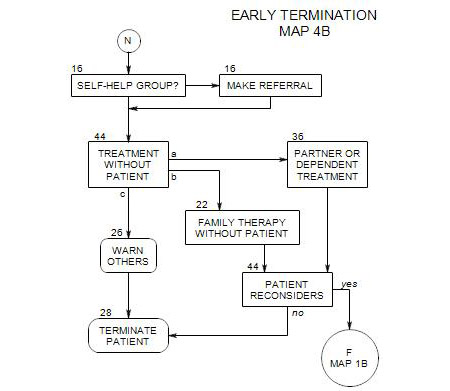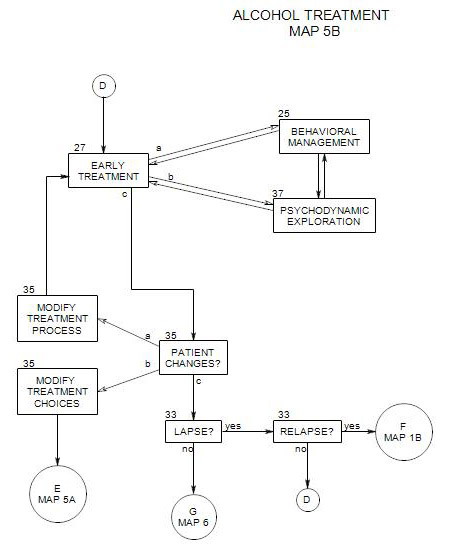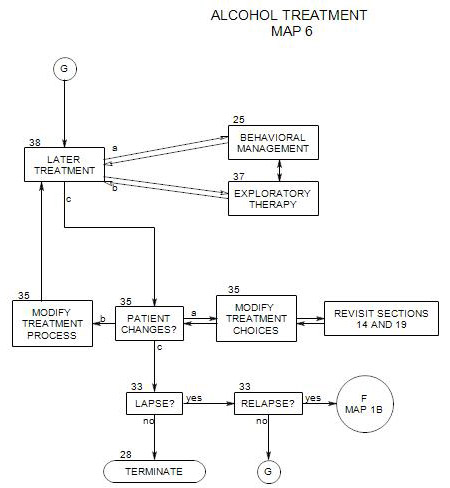15. INDIVIDUAL PSYCHOTHERAPY
- This section follows Section 14 [Primary Care Decision] or Section 19 [Adjunctive Care Decision] on Map 4 for some patients.
This is certainly the most convenient form of treatment for most therapists. It is the easiest to arrange for a single patient, and the arrangements can be adjusted to accommodate to the needs of the patient and therapist. It often makes the most sense to continue in therapy with a patient who was seen for a consultation or assessment.
The work can be done from a variety of theoretical perspectives, including cognitive, Jungian, psychoanalytic, Buddhist points of view. Because individual therapists already have their own theoretical perspectives and each one – -.. there will be no attempt here to articulate them.
However, some technical perspectives are less likely to be helpful. The involvement of a behavioral approach is more likely to be helpful to a patient recovering from alcohol misuse than the restraint of a psychoanalytic technical stance. A purely exploratory approach early in treatment can both fail to address the person’s immediate needs and also increase internal stresses to the point of counter-productivity. Brief therapy is unlikely to work for most patients.
Within these limitations, the individual approach is so potentially powerful and flexible that it is the perspective for the rest of this book. The steps are the ones an individual therapist would follow
15a. Uses of Individual Psychotherapy
AS AN ADJUNCTIVE FORM OF TREATMENT
Early on, group therapy, couple therapy or self-help work may seem primary to the patient because of its relevance to the patient’s issues and struggles. However, even when other forms of therapy are emotionally or functionally primary, individual treatment can be the place where issues raised are processed for their personal significance, history and impact. It is also likely that over time individual therapy will come to be primary because of its greater personal relevance and effectiveness.
AS PRIMARY FORM OF TREATMENT
Any of the other treatment modalities can be adjunctive to it, depending on accessibility and the primary therapist’s choices to include them in the treatment process. However, someone needs to coordinate the various aspects of the patient’s overall treatment plan. If it is not the individual therapist, there should be a designated coordinator, and the individual therapist should be in regular contact with that person.
Exploratory psychotherapy can pursue a range of issues in order to help the patient become more aware of him/herself and his or her use of alcohol, including:
- the patient’s relationship with alcohol
- the effect of alcohol on his/her life
- the importance of alcohol
- the meaning of alcohol
- the patient’s strength of motivation to change and where it comes from
- when and where he/she drinks
- what effect is intended
- how he/she deals with consequences
- what from his/her denial takes (“What do you say to yourself to make it seem OK?”)
- what alternatives he/she has that could serve the same functions as alcohol [e.g.: drinking soft drinks at social gatherings].
15b. Managing the Session to Deal with Different Treatment Components
The ability to modify the treatment on a week-to-week or minute-to minute basis is one of the major advantages of individual psychotherapy. A therapist is constantly listening for the patient’s current status, issues and needs, and responding with psychological interventions that attempt to help the patient cope more effectively.
The theoretical issues a therapist listens for will depend on his or her training. Learning to listen effectively is a skill best taught in supervision and the therapist’s personal therapy.
A therapist may need to keep track of a number of variables at the same time, and note which issue or theme is salient at the moment.
- —the patient’s current stage of change relative to alcohol use and sobriety. This can vary from week-to-week, or even in a single session [Conners etal, 2001, 89-100]
- —the relative importance of the patient’s issues with alcohol and any other co-occurring psychological issues or disorders he/she may have
- —the patient’s defenses, and whether they are working in support of treatment and sobriety or interfering with it.
—Each change in patient focus requires choices on the part of the therapist
—Whether to follow the patient into the new theme or keep the focus on the old one.
—Whether to think of the change of topic as normal flow and free association or defensive avoidance of the prior topic.
The therapist should also make choices about how to deal with the varying topics in a session. Some possibilities are to
- Split the session on some formal basis for example: “Let’s work on your drinking issues for the first twenty minutes or so, and then move on to other things.”
- Go back and forth, making a point of drawing attention to the person’s drinking as it seems implicit in other work. For example, “Well, what about being so tense? Were you tempted to relieve the tension by drinking?”
- Follow the patient, address each issue as it comes up, but interpret the patient’s avoidances and other defenses where helpful.
